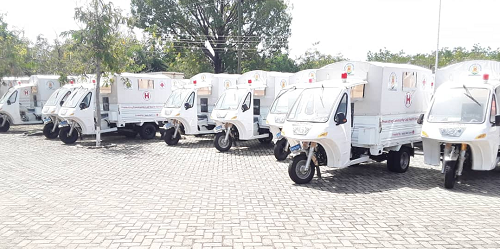
Ghana Health Service takes delivery of tricycle ambulances in Upper East
The Upper East Regional Directorate of the Ghana Health Service has taken delivery of twenty-two tricycle ambulances and 73 Haemocue (blood testing) machines for distribution to six deprived districts in the Region.
The beneficiary districts are Bongo, Binduri, Nabdam, Kassena Nankana Municipality, Pusiga and Talensi.
The facilities were provided by the Ghana Red Cross Society (GRCS) with support from the Swiss Red Cross(SRC) at an estimated cost of GH¢ 1 million. The package includes the provision of communication gadgets and training for the riders of the Tricycles, midwives and other health staff in the beneficiary health facilities who would be using the Haemocue machines.
It was provided under the Maternal, New-Born and Child Health Project (MNCH) being implemented in the six beneficiary districts. The tricycle ambulances would enable pregnant mothers and new born babies suffering from emergency health cases and referred to bigger health facilities to be conveyed to those health centres in a timely manner to prevent deaths and complications. On the other hand,the Haemocue machines would help improve on Haemoglobin (Oxygen carrying capacity of blood) testing of pregnant mothers suspected to be anaemic in health centres in the six beneficiary districts.
Ceremony
Addressing the handing over ceremony at Bolgatanga on Wednesday, October 28, 2020, the Swiss Red Cross Country Coordinator, Mr Thomas Okollah observed that since 2014, the organization had supported the MNCH project in the Upper East Region with the GRCS as the implementing agency.
![]()
He explained that the project was designed to use community volunteers organized into Ghana Red Cross Mothers' Clubs which had complemented government's efforts in reducing maternal and neonatal mortality in the beneficiary districts.
“It came to light during the initial stage of the project that pregnant women, post-natal mothers and newborns who needed acute health services were challenged by inability to easily access health facilities due to lack of reliable means of transport” Mr Okollah stated.
He further observed that this limited access to health facilities contributed to “unpredictable pregnancy outcomes and negatively impacted maternal and child health".
Response
The Country Coordinator indicated that “as a need responsive organisation, Red cross procured one tricycle in 2016 as a pilot project to increase access to health facilities in a community in the Binduri district which proved successful".
He said increased requests from the GHS at the district level and the Mothers’ club members made the GRCS and SRC to procure additional ten tricycles in 2017 and donated them to 10 Community Health-based Planning Services (CHPS) compounds in the beneficiary districts to support referral of pregnant mothers and children to health facilities.
Mr Okollah said further appeals from members of the Mothers' club and the GHS for more tricycles in the beneficiary districts led to this latest intervention.
Anaemia
The Regional Director of the GHS, Dr Winfred Ofosu acknowledged the “critical role of tricycle ambulances in community transport system especially in transporting pregnant women and newborns as well as patients with emergency health conditions from communities with lower level facilities to higher level health facilities for urgent medical attention".
Dr Ofosu pointed out that Anaemia which referred to low red blood cells capacity was an important health condition in pregnancy as it could adversely affect healthy development of the unborn baby and the mother as well as cause deaths in some cases.
“The Haemocue machines would facilitate regular testing of Haemoglobin level for pregnant women and other patients to detect anaemia and avert preventable deaths,” the director noted.
Mortality
Dr Ofosu disclosed that since 2017, the proportion of pregnant women making at least four Antenatal care visits before delivery increased from 82.3 percent in 2017 to 83.5 percent in 2019 with a decline to 79.1 percent in 2018.
As expected,institutional Maternal Mortality ratio had declined over the last three years from 137.5 per 100,000 live births in 2017 to 82 per 100,000 live births in 2019.
Institutional neonatal deaths have remained stagnant but declined from 7.7 per 1,000 live births in 2017 to 6.3 per1,000 live births in 2018.It however rose to 8.7 per 1,000 live births in 2019.
Mothers Clubs
The President of the GRCS,Mr Kwame Gyimah Akwafo announced that there were 2,080 members of the Mothers' Clubs in the beneficiary districts working with the organization to achieve goals of the MNCH project.
The project is also working with 80 Mothers' clubs in 80 communities in the beneficiary districts.
The Clubs he noted had served as important link between the beneficiary districts and health facilities on maternal and child health issues. They have also assisted in promoting mother and child health related messages, identified danger signs in pregnant women, post-natal mothers and newborns as well as facilitated their referral to higher level health facilities for effective medical attention.
Appreciation
The Upper East Regional Minister, Miss Tangoba Abayage in a speech read on her behalf,expressed gratitude to the GRCS and the SRC for playing a key role in reducing maternal and child mortality in the beneficiary districts.
